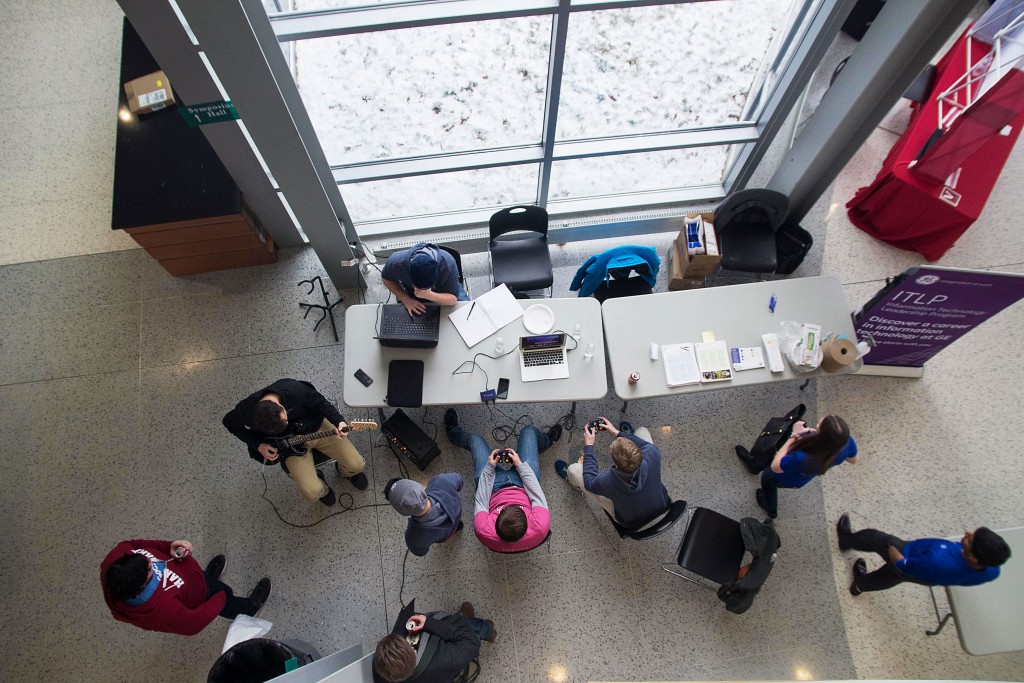
Over 250 students from universities across New York and New Jersey arrived at Binghamton University on Saturday morning with overnight bags and pillows in hand for the third annual HackBU hackathon.
The competition kicked off at 11:30 a.m. in the Innovative Technologies Complex (ITC). Itai Ferber, a senior majoring in computer science, organized the competition with the help of 15 other BU volunteers. For the event, participants work on original, short-term coding projects within a strictly timed 24-hour period.
Volunteers worked with Major League Hacking (MLH), the official student hackathon league of the U.S., Mexico, Canada and Europe, to help organize and promote the event. MLH provided mentorship and hardware like virtual reality headsets, micro-controller boards and computer monitors to students throughout the event.
This year’s sponsors included Vanguard, Lockheed Martin, Viacom, General Electric, Hudson River Trading, AIS, Bloomberg, PricewaterhouseCoopers, Peloton, Deloitte and Envisage. According to Langert, many companies have deviated from more traditional hiring routes, and instead send representatives to collect resumes and recruit at hackathons. Viacom, Vanguard and GE also hosted a series of talks about the industry throughout the afternoon.
According to Ferber, sponsorship nearly doubled this year, allowing HackBU to host a better event with catered lunch and dinner, and provide buses to 10 schools in New Jersey and New York to transport hackers to BU.
Organizers cut the event from 36 hours to 24 this year because, according to Ferber, the 36-hour format allowed too many students to go home in the middle of the competition.
“I think, shorter hackathon, more students, better investment in the students, is a better formula for us,” Ferber said.
According to Erik Langert, a junior double-majoring in computer science and mathematics, it was difficult to keep students focused throughout the event in past years, as many BU students would return to their dorms throughout the day.
“We realized to have a more solid presence throughout the event, we wanted to bring outside students to Binghamton,” Langert said. “Not only would we get to show them our awesome facilities, but we’d also have students who are required to be in the building and who would be hacking the entire time.”
By Saturday night, the atrium of the ITC was strewn with plates from dinner and scattered with students playing Jenga and Mario Cart. Hackers filtered in and out of the space, some in pajamas, with looks of exhaustion. By Sunday morning at 11:30, the competition came to a close, and projects ranging in ideas were presented.
Matt Poegel, a student from Renssalaer Polytechnic Institute, created a 2D side-scrolling game that was based off of Donald Trump’s quest for the White House. The rules of the game included collecting all of Trump’s hair while defeating his enemies by throwing wads of money at them.
Alexander Jackson, a junior majoring in electrical engineering, worked on creating a game called “Say It,” utilizing AT&T’s speech-to-text application program interface (API). His program was able to translate voice recordings and display them on a screen. The rule of the game was to say a word beginning with the last letter of the previous word. With the help of a dictionary function, users received a score for each word based on the prevalence of the letters in the word.
“Getting the AT&T API to work requires a lot of file-type matching, a lot of multi-threading to allow you to fetch data from the server while the game is continuing to run and making that seamless is a very difficult process,” Jackson said.
“Say It” came in second place, and a group of five students from Rutgers and Cornell won first place by creating “Codiggity,” a rap generating machine. Codiggity requires the user to enter a word, which starts the rhyming sequence, and an automated voice raps the lyrics in sync with the music. Each member of the team won a Dell Venue 8 Tablet, Bluetooth Foldable Keyboard and Google Cardboard as well as $100 for a team dinner.


